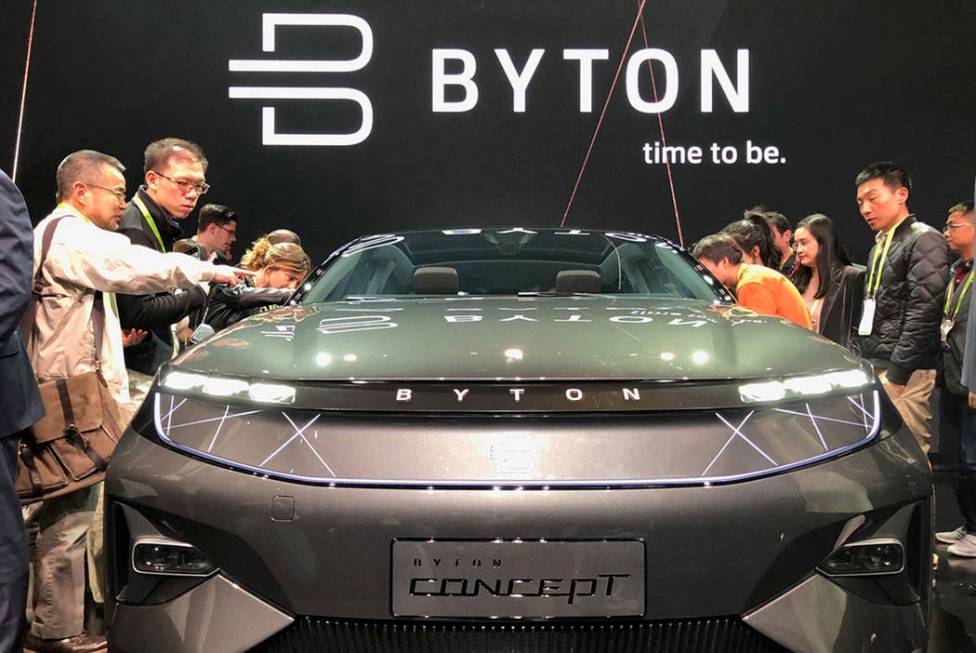Dynamic dual: At CES, Byton car is both self-driving, electric

Former BMW executives are trying to muscle into the crowded automotive market with the launch of an electric car equipped with autonomous driving capability.
The first Byton, whose name derives from “bytes on wheels,” was unveiled Sunday at Mandalay Bay ahead of CES, which begins this week. About 180,000 people are expected to visit CES, formerly known as the Consumer Electronics Show, this week.
Byton aims to roll its first cars out of its Chinese factory by the end of 2019, co-founder and Chief Executive Officer Carsten Breitfeld said. The cars, with prices starting at around $45,000, will be sold in China at first, with U.S. sales beginning in early 2020.
Byton will try to distinguish itself from its many larger competitors largely by offering greater connectivity, Breitfeld said, referring to his car as a “smart device.”
Byton car will be integrated with #Amazon Alexa. Cars to begin rolling out of China-based production plant at end 2019 and sell for ~$45,000. #ces2018 pic.twitter.com/ry6kMxRt33
— Todd Prince (@toddprincetv) January 7, 2018
The car will be the first with a tablet incorporated into the steering wheel and rotating front seats. The dashboard features a screen running 1.25 meters by 0.25 meters and can be operated with hand gestures.
Antennas integrated into the roof will let the car transmit data at 10 gigabytes per second once fifth-generation wireless technology is rolled out, said Breitfeld. That data transmission speed would be 100 times faster than the average data transmission speeds for smartphones now.
Alexa, Amazon’s voice-activated personal assistant, will be integrated into the car, he said. Byton’s presentation at Mandalay Bay featured video of a driver ordering food from Amazon’s Whole Foods Market through the car’s interface.
$320 million raised
The company was co-founded two years ago by Breitfeld, who previously headed up BMW’s hybrid car program, and Daniel Kirchert, a former BMW sales executive in China.
The company aims to combine low-cost Chinese manufacturing with German engineering and design and U.S. technology. Byton’s design office is based in Munich while its technology headquarters is in Santa Clara, California, in the heart of Silicon Valley.
The company raised has raised $320 million in two rounds of funding from Chinese investors. Byton plans a third round of funding this year, Kirchert said.
#Byton car will be equipped with 5G capability, transmit data at 10GB/s and reach Level 4 autonomous driving in 2020. #ces2020. @reviewjournal pic.twitter.com/XKqCC0PqSi
— Todd Prince (@toddprincetv) January 7, 2018
The Nanjing plant will initially produce 100,000 cars a year and increase to 300,000 over several years. The total investment in the plant will be about $1 billion, Kirchert said.
Byton is focusing on the Chinese car market because it is the world’s largest and one of the fastest-growing, Kirchert said. He added that China is very aggressive in pushing smart transport solutions.
”What I am really impressed by is how fast things are moving in China and how fast decisions are executed there,” he said.
CES has become a platform for startup companies, including automakers, to launch their products.
Faraday Future, another electric car maker financed by Chinese investors, unveiled its prototype last year at CES. Since then, the company has struggled financially, announcing in the summer that it halted work on its Nevada plant.
Contact Todd Prince at tprince@reviewjournal.com or 702-383-0386. Follow @toddprincetv on Twitter.